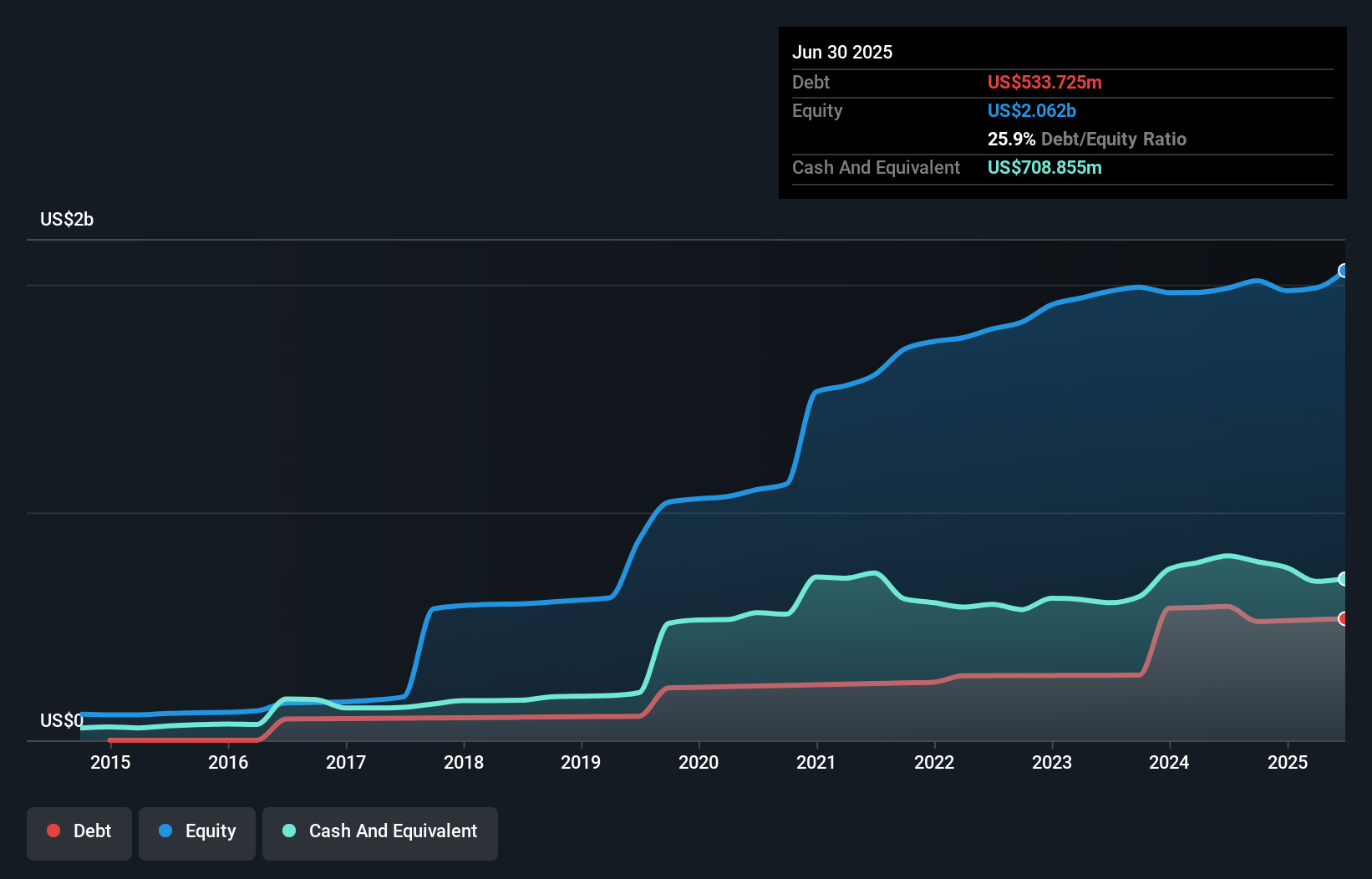Legendary fund manager Li Lu (who Charlie Munger backed) once said, 'The biggest investment risk is not the volatility of prices, but whether you will suffer a permanent loss of capital.' So it might be obvious that you need to consider debt, when you think about how risky any given stock is, because too much debt can sink a company. We note that Repligen Corporation (NASDAQ:RGEN) does have debt on its balance sheet. But is this debt a concern to shareholders?
Why Does Debt Bring Risk?
Debt is a tool to help businesses grow, but if a business is incapable of paying off its lenders, then it exists at their mercy. Part and parcel of capitalism is the process of 'creative destruction' where failed businesses are mercilessly liquidated by their bankers. However, a more common (but still painful) scenario is that it has to raise new equity capital at a low price, thus permanently diluting shareholders. Of course, plenty of companies use debt to fund growth, without any negative consequences. The first thing to do when considering how much debt a business uses is to look at its cash and debt together.
What Is Repligen's Net Debt?
The image below, which you can click on for greater detail, shows that Repligen had debt of US$533.7m at the end of June 2025, a reduction from US$587.2m over a year. However, its balance sheet shows it holds US$708.9m in cash, so it actually has US$175.1m net cash.

A Look At Repligen's Liabilities
The latest balance sheet data shows that Repligen had liabilities of US$123.0m due within a year, and liabilities of US$716.9m falling due after that. Offsetting this, it had US$708.9m in cash and US$157.0m in receivables that were due within 12 months. So it actually has US$25.9m more liquid assets than total liabilities.
This state of affairs indicates that Repligen's balance sheet looks quite solid, as its total liabilities are just about equal to its liquid assets. So it's very unlikely that the US$6.88b company is short on cash, but still worth keeping an eye on the balance sheet. Succinctly put, Repligen boasts net cash, so it's fair to say it does not have a heavy debt load!
See our latest analysis for Repligen
Better yet, Repligen grew its EBIT by 109% last year, which is an impressive improvement. That boost will make it even easier to pay down debt going forward. There's no doubt that we learn most about debt from the balance sheet. But ultimately the future profitability of the business will decide if Repligen can strengthen its balance sheet over time. So if you're focused on the future you can check out this free report showing analyst profit forecasts.
But our final consideration is also important, because a company cannot pay debt with paper profits; it needs cold hard cash. While Repligen has net cash on its balance sheet, it's still worth taking a look at its ability to convert earnings before interest and tax (EBIT) to free cash flow, to help us understand how quickly it is building (or eroding) that cash balance. Over the last three years, Repligen actually produced more free cash flow than EBIT. That sort of strong cash conversion gets us as excited as the crowd when the beat drops at a Daft Punk concert.
Summing Up
While it is always sensible to investigate a company's debt, in this case Repligen has US$175.1m in net cash and a decent-looking balance sheet. And it impressed us with free cash flow of US$103m, being 140% of its EBIT. So we don't think Repligen's use of debt is risky. Another factor that would give us confidence in Repligen would be if insiders have been buying shares: if you're conscious of that signal too, you can find out instantly by clicking this link.
Of course, if you're the type of investor who prefers buying stocks without the burden of debt, then don't hesitate to discover our exclusive list of net cash growth stocks, today.
New: AI Stock Screener & Alerts
Our new AI Stock Screener scans the market every day to uncover opportunities.
• Dividend Powerhouses (3%+ Yield)
• Undervalued Small Caps with Insider Buying
• High growth Tech and AI Companies
Or build your own from over 50 metrics.
Have feedback on this article? Concerned about the content? Get in touch with us directly. Alternatively, email editorial-team (at) simplywallst.com.
This article by Simply Wall St is general in nature. We provide commentary based on historical data and analyst forecasts only using an unbiased methodology and our articles are not intended to be financial advice. It does not constitute a recommendation to buy or sell any stock, and does not take account of your objectives, or your financial situation. We aim to bring you long-term focused analysis driven by fundamental data. Note that our analysis may not factor in the latest price-sensitive company announcements or qualitative material. Simply Wall St has no position in any stocks mentioned.
About NasdaqGS:RGEN
Repligen
A life sciences company, develops and commercializes bioprocessing technologies and systems in North America, Europe, the Asia Pacific, and internationally.
Excellent balance sheet with reasonable growth potential.
Similar Companies
Market Insights
Community Narratives



